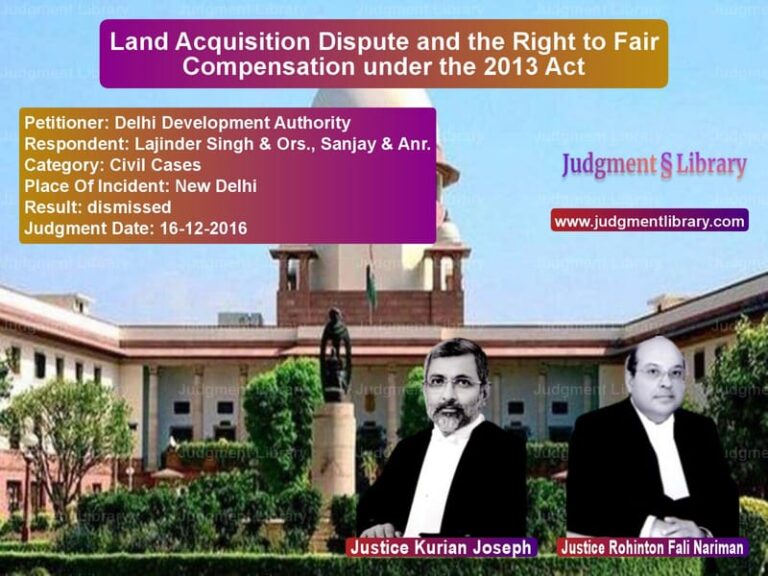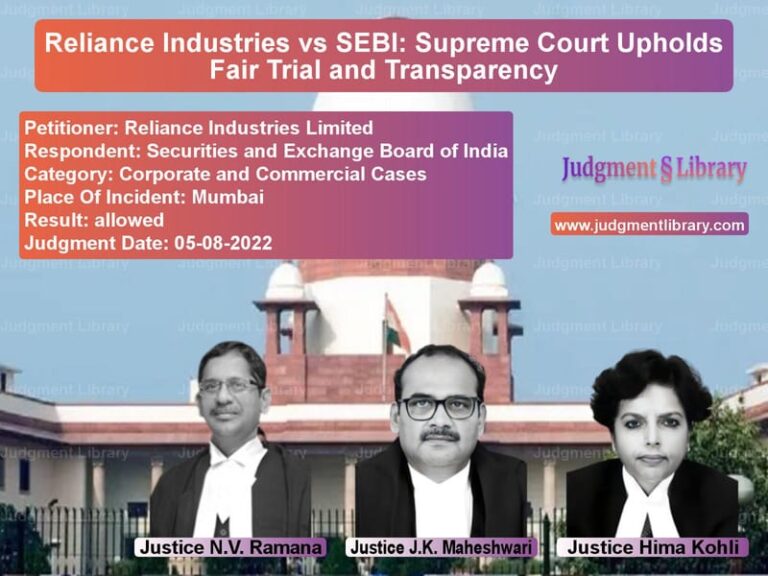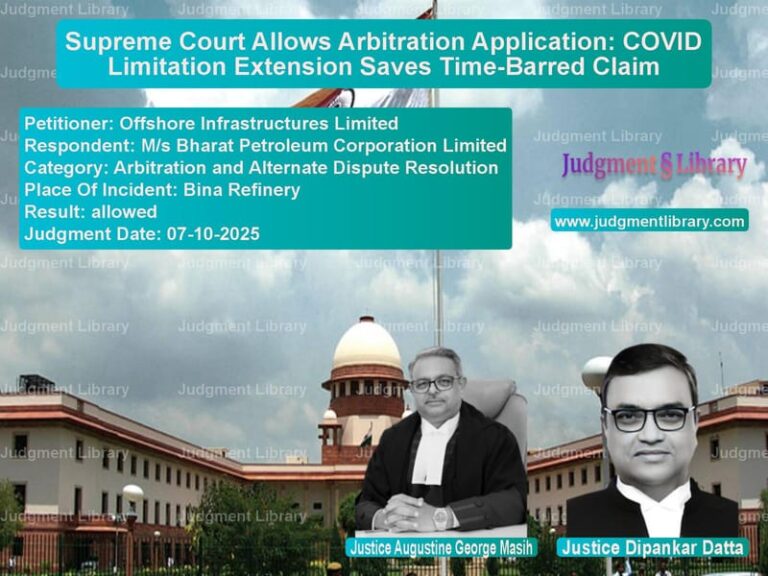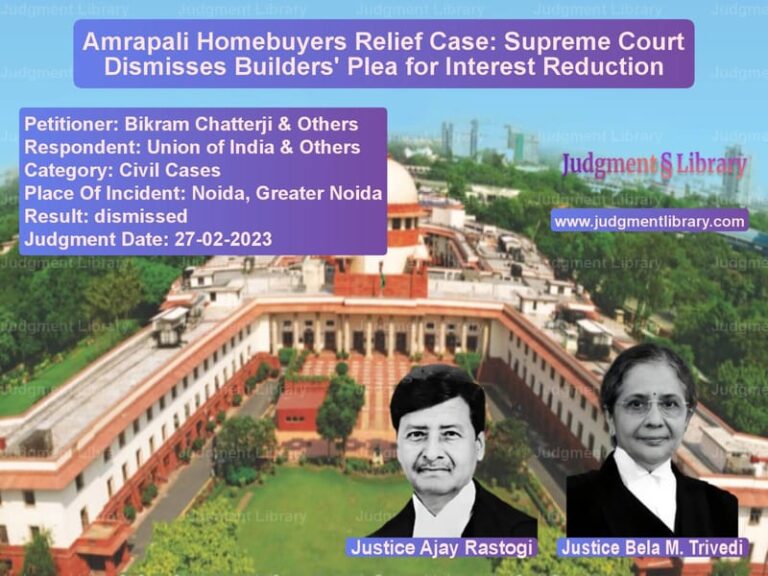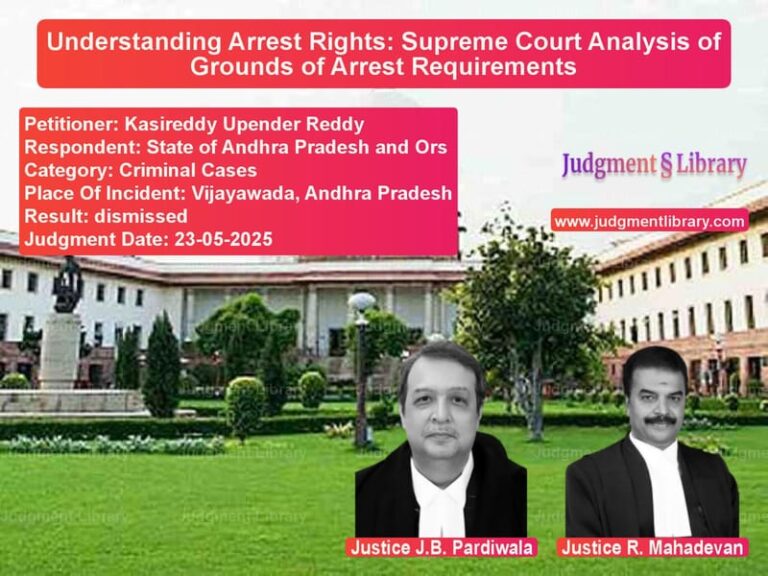Victim Compensation in Anticipatory Bail: Supreme Court Strikes Down Unlawful Condition
The case of Talat Sanvi vs. State of Jharkhand & Anr. deals with a critical question regarding bail jurisprudence in India. The central issue in this case was whether a court could impose the condition of interim victim compensation while granting anticipatory bail. In a landmark decision on January 24, 2023, the Supreme Court ruled that such a condition was legally untenable and quashed it, reaffirming that victim compensation is not a pre-trial matter but arises only after the final adjudication of a case.
This judgment is significant because it prevents monetary conditions from influencing bail decisions, ensuring that financial capacity does not become a determinant of an individual’s freedom. By reiterating established legal principles, the Court reinforced the constitutional guarantee of equality before the law.
Background of the Case
The dispute originated when the appellant, Talat Sanvi, was granted anticipatory bail by the Jharkhand High Court but with a condition to pay interim victim compensation. The appellant challenged this order, arguing that anticipatory bail cannot be contingent upon monetary compensation, as it prejudges the case before trial.
Key Legal Issues
- Can a court impose a condition of interim victim compensation while granting anticipatory bail?
- Does victim compensation fall within the scope of bail proceedings?
- What is the legal framework governing victim compensation in India?
Petitioner’s Arguments
The counsel for the petitioner, Talat Sanvi, put forth the following arguments:
- Victim compensation cannot be a pre-condition for anticipatory bail, as it prejudges the case before trial.
- There is no provision in the Code of Criminal Procedure (CrPC) that allows courts to impose such conditions.
- The Supreme Court had previously ruled in Sahab Alam vs. State of Jharkhand and Udho Thakur vs. State of Jharkhand that bail cannot be granted based on the ability to pay compensation.
Respondent’s Arguments
The State of Jharkhand defended the condition, arguing:
- Victim compensation ensures justice for victims at an early stage.
- The courts have broad discretionary powers in bail matters.
- While bail jurisprudence does not specifically mandate victim compensation, courts should be free to impose such conditions if they find it necessary.
Supreme Court’s Observations
The Supreme Court, comprising Justice Sanjay Kishan Kaul and Justice Abhay S. Oka, made the following key observations:
“The issue raised in this appeal is whether interim victim compensation in proceedings for anticipatory bail can be imposed as a condition for the same. We do believe that the impugned order suffers from an infraction of law as the question of interim victim compensation cannot form part of the bail jurisprudence.”
Read also: https://judgmentlibrary.com/murder-conviction-upheld-supreme-court-ruling-in-john-anthonisamy-case/
Legal Framework for Victim Compensation
The Court elaborated on the legal framework governing victim compensation:
- Section 357 CrPC: Allows compensation when a fine is imposed as part of a sentence.
- Section 357A CrPC: Introduced the Victim Compensation Scheme, allowing state governments to compensate victims, but only post-conviction.
- Judicial Precedents: Courts have consistently held that compensation should be determined after trial, not at the bail stage.
Supreme Court’s Final Ruling
The Supreme Court ruled that:
- Victim compensation is linked to the final determination of the case and cannot be imposed during bail proceedings.
- The anticipatory bail order, except for the condition of interim victim compensation, was upheld.
- The appeal was allowed, and the condition of compensation was quashed.
Implications of the Judgment
This ruling sets a significant precedent:
- Monetary compensation cannot be a precondition for bail.
- Victim compensation is a post-trial remedy, not a pre-trial requirement.
- Ensuring fair bail conditions is crucial for upholding the rights of the accused.
Conclusion
The Supreme Court’s decision in Talat Sanvi vs. State of Jharkhand reinforces the principle that bail conditions must align with established legal principles. By quashing the compensation condition, the Court safeguarded the integrity of bail jurisprudence and ensured that monetary considerations do not influence pre-trial proceedings.
Petitioner Name: Talat Sanvi.Respondent Name: State of Jharkhand & Anr..Judgment By: Justice Sanjay Kishan Kaul, Justice Abhay S. Oka.Place Of Incident: Jharkhand, India.Judgment Date: 24-01-2023.
Don’t miss out on the full details! Download the complete judgment in PDF format below and gain valuable insights instantly!
Download Judgment: talat-sanvi-vs-state-of-jharkhand-&-supreme-court-of-india-judgment-dated-24-01-2023.pdf
Directly Download Judgment: Directly download this Judgment
See all petitions in Bail and Anticipatory Bail
See all petitions in Legal Malpractice
See all petitions in Judgment by Sanjay Kishan Kaul
See all petitions in Judgment by Abhay S. Oka
See all petitions in allowed
See all petitions in Quashed
See all petitions in supreme court of India judgments January 2023
See all petitions in 2023 judgments
See all posts in Criminal Cases Category
See all allowed petitions in Criminal Cases Category
See all Dismissed petitions in Criminal Cases Category
See all partially allowed petitions in Criminal Cases Category


